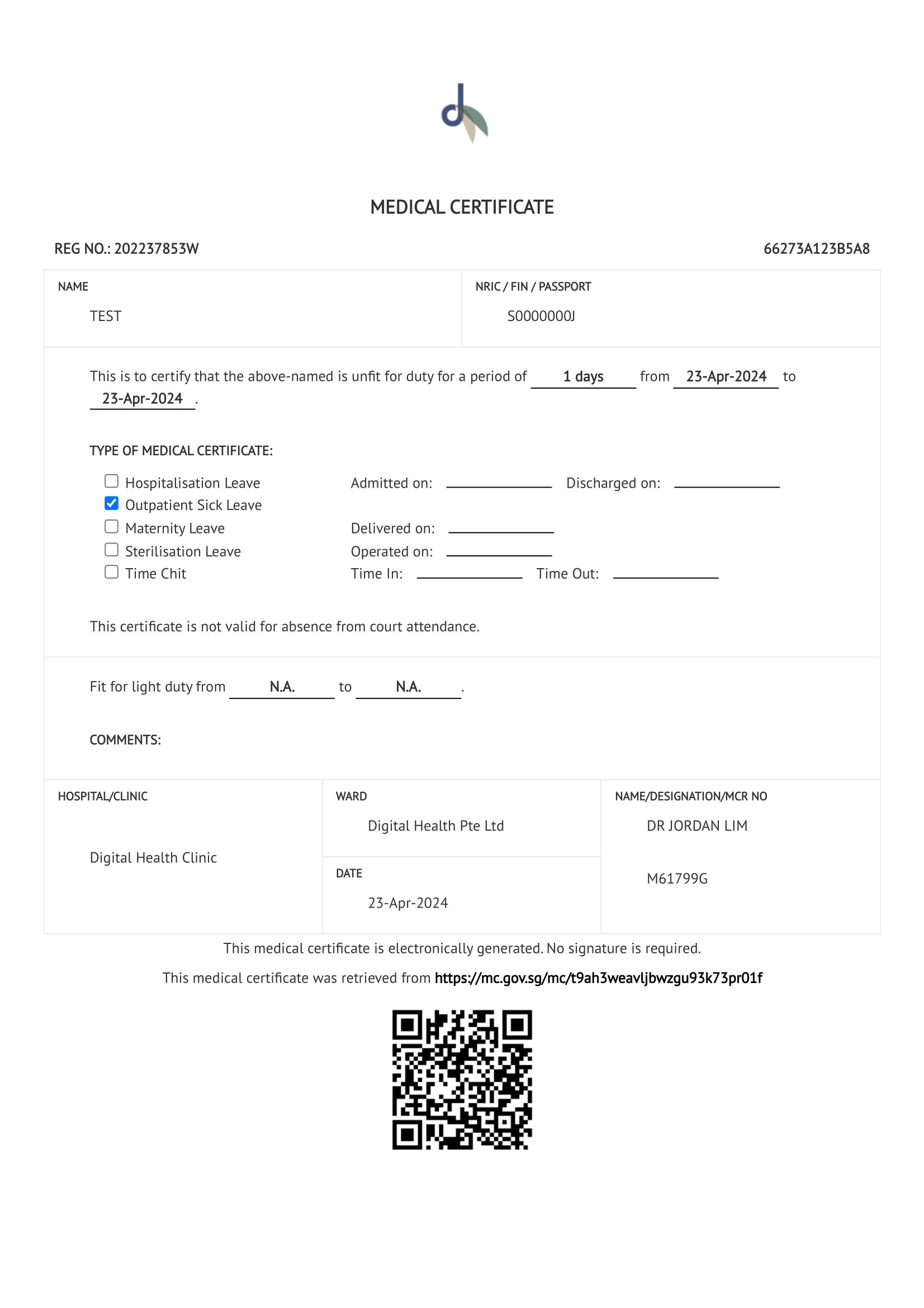Falling ill is part of being human. Schools, employers, and even enrichment centres in Singapore often require a medical certificate (MC) to confirm you were genuinely unfit for duty. If you would rather recover at home than travel to a crowded clinic, here is how to obtain a legitimate MC online—without risking compliance issues.
What this guide covers
- What counts as a medical certificate?
- Why schools and employers insist on MCs
- Ways to obtain an MC in Singapore
- How online MCs work
- Steps for your next teleconsult
- Preparation checklist before the call
- Red flags when choosing a provider
- What makes an MC valid
- Can you buy or rush an MC?
- When teleconsults are not appropriate
What is a medical certificate?
An MC (or sick note) is a medicolegal document written by a Singapore Medical Council (SMC) registered doctor. It certifies that you were assessed and found medically unfit for work, school, or other activities. MCs can also specify light duties—for example, excusing heavy lifting—when you are recovering.
With the Ministry of Health recognising telemedicine for mild conditions, a doctor can conduct the required assessment via secure video before issuing the certificate.
Remember: Only licensed doctors may issue MCs. Self-declared notes or automated letters are not a substitute unless your employer explicitly accepts them.
Why do you need to produce an MC?
Schools discourage students from attending classes while contagious, and workplaces rely on MCs to keep records transparent. Legitimate MCs:
- Protect others from catching your illness.
- Document paid sick leave entitlement under the Employment Act.
- Provide evidence for rescheduling exams, enrichment classes, or shift work.
Some organisations allow parental or self-declaration letters for minor issues, but repeated absences usually trigger a request for an MC.
How to obtain an MC in Singapore
You can visit a physical clinic or consult a doctor online. Traditional clinics remain essential for complex cases, but wait times can reach hours during peak periods. Telemedicine diverts mild cases away from in-clinic queues, freeing capacity for patients who truly need a hands-on exam.
By resting at home and consulting online for minor ailments, you help clinics focus on patients who require in-person procedures or monitoring.
Getting an MC online
Telemedicine lets you connect with a licensed doctor via secure video, describe your symptoms, and receive both medication and an MC if clinically warranted. Many platforms work entirely through the browser so there is no app to download.
Steps for arranging a teleconsult
- Check your symptoms: Teleconsults are ideal for mild issues like fever, cough, diarrhoea, headaches, or menstrual cramps.
- Register with Singpass / MyInfo: Authentication ensures the MC is issued to the correct identity.
- Join the virtual waiting room: Most patients connect with a doctor within 5–10 minutes.
- Undergo assessment: Explain what keeps you from work or school; be honest and specific.
- Review your MC and medications: Digital MCs are issued via email, while medicines are dispatched in sealed packaging.
Preparation checklist
- Find a private, well-lit room to protect confidentiality.
- Have your NRIC or identification at hand for verification.
- Note the start time of your symptoms and any relevant medical history.
- Be polite and precise—teleconsults rely heavily on self-reported information.
Red flags to avoid
Trustworthy telemedicine platforms are transparent. Be cautious if you see any of these warning signs:
- Poor reviews for missing or incorrect medication deliveries.
- No live video consult required (two-way video is mandated for patient safety).
- No doctor profiles or accountability information on the website.
- “Guaranteed MC” before a consultation—this is likely invalid.
- Hidden fees or surge pricing disclosed only after the consult.
- Unresponsive customer service when you need support or documents.
- Buggy apps that repeatedly drop the call.
- Platforms that never dispense medication, implying the focus is just on selling MCs.
What makes an MC valid?
A legitimate certificate includes:
- Unique serial number for verification.
- Type of leave (sick leave, light duty, etc.).
- Date of issue (same day as consultation unless clinical history justifies earlier cover).
- Duration of leave granted.
- Doctor’s name and MCR number.
- Your name and identification number.
- Official issuer details—for electronic MCs, look for a link hosted on mc.gov.sg.

Can you buy or rush an MC?
No. It is illegal to purchase an MC or generate one without a consultation. Doctors must assess you before issuing a certificate. Likewise, “one-minute MCs” are a red flag—sound clinical judgment takes more than a few scripted questions.
When teleconsults are not appropriate
Serious symptoms warrant an in-person visit or emergency care:
- Severe abdominal pain or suspected appendicitis.
- Fever lasting more than a few days.
- Sudden, intense headaches or neurological changes.
- Repeated vomiting that prevents hydration.
- Chest pain or shortness of breath.
- Vague but significant deterioration, especially in very young or elderly patients.
How telemedicine medication delivery works
After the consult, medications are packed in tamper-evident packaging and dispatched to your address—most providers aim for delivery within a few hours. If a requested drug is unavailable, your doctor will suggest alternatives or arrange a refund.
Common myths and quirks about MCs
- No back-dating: MCs cannot pre-date the consultation unless the clinical picture clearly supports earlier cover.
- No edits by other doctors: Only the issuing doctor may amend the certificate.
- Short durations online: Telemedicine MCs usually cover one to two days; longer rest often requires a face-to-face review.
- Frequent MC requests flag underlying issues: Doctors may refer you for further testing if symptoms recur too often.
Final thoughts
Telemedicine offers a safe, convenient route to legitimate medical certificates when you are genuinely unwell. Prioritise platforms that require a proper video consult, publish their doctor roster, and issue MCs through official channels. When in doubt, speak to your HR department—they may accept a combination of MCs, self-declarations, or other documentation depending on company policy.

